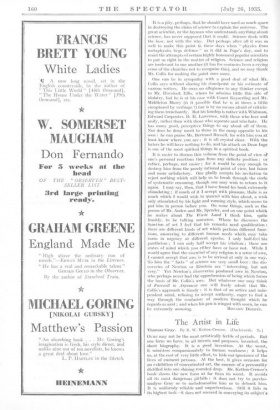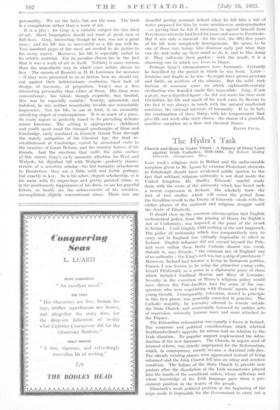The Artist in Life
Thomas Gray; By R. W. Ketton-Cremer. (Duckworth. 2s.) Ouns may not be the most artistically fertile of periods. But one form we have, to all intents and purposes, invented, the short biography. It is a good invention. At the worst, it ministers compassionately to human weakness ; it helps us, at the cost of very little effort, to hide our ignorance of the lives of eminent persons. At the best, it gives occasion for an exhibition of concentrated art, the essence of a personality distilled into one shining rounded drop. Mr. Ketton-Cremer's book shows the few form at far from its worst. It avoids all its most dangerous pitfalls : it does not try to psycho- analyse Gray or to melodramatize him or to debunk him. It is uniformly reliable.• and unpretentious. Still it fails in its highest task—it does not succeed in conveying its subject's personality. We see the facts, but not the man. The book is a compilation rather than a work of art.
It is a pity ; for Gray is a suitable subject for this kind Of art. Short biographies should not treat of great men or full lives. Gray, interesting though he was, was not a great Man ; and his life was as uneventful as a life can well be. Two hundred pages at the most are needed to do justice to his every aspect. Moreover, his life is especially suited to be artistic material. For its peculiar charm lies in the fact that it was a work of art in itself. Nothing is more curious than the unaesthetic way in which some artists choose to' live. The careers of Rossetti or D. H. Lawrence for instance —if they were presented to us as fiction; 'how we should cry out against their indeterminate confusion, their lack of design, of harmony, of proportion. Gray's was a less interesting personality than either of these. His ideas were conventional ; his talent, though exquisite, was limited. Nor was he especially amiable. Touchy, spinsterish and indolent, he was neither remarkably lovable nor remarkably impressive. Yet his life, to me at least, is an eminently satisfying object of contemplation. It is so much of a piece, its every aspect so perfectly tuned to its prevailing delicate minor harmony. The setting is appropriate ; childhood and youth spent amid the tranquil quadrangles of Eton and Cambridge, early manhood in leisurely Grand Tour through the stately antiquities of the Classical Age, the final re- establishment at Cambridge, varied by occasional visits to the beauties of Great Britain, and the country houses of his friends. And the emotions that ruffle the calm surface of this career, Gray's early romantic affection for West and Walpole, his dignified tiff with -Walpole—perfectly charac- teristic of a sensitive scholar—his last romantic attachment to Bonstetten—they are a little mild and feeble perhaps, but exactly in key. So is his sober, elegant scholarship, so is his room with its engravings and pretty painted china, so is the gentlemanly foppishness of his dress, so are his graceful letters, so finally are the achievements of his sensitive, accomplished, slightly conventional slime. There was one dreadful jarring moment indeed when he fell into a tub of water prepared for hint by some mischievous undergraduates —so jarring that he felt it necessary to uproot himself from Peterhouse where he had lived for years and move to Pembroke. But it was only a moment—for the rest, the fifty-five years of his life were completely homogeneous. He seems to be one of those rare beings who discover early just what they can do, and make up their mind to do it, and to like doing it. They cultivate their garden : with the result, it is a charming one in which one loves to linger.
Perhaps Gray's circumstances were • fortunate. Certainly he benefited by the period in which he was born. Later— feminine and fragile as he washe might have grown precious and futile, an aesthete of the nineties. But the solid rock bottom of common sense on Which eighteenth-century civilization was founded made this impossible. Gray, if not a great, was a dignified figure—he did not waste his time over trivialities, his life and much of his work owes its flavour to the fact it was always in touch with the natural unaffected emotions, the rational interests of humanity. It is, in fact, the combination of these things with his temperament that give life and work alike their charm—the charm of a graceful, sensitive variation on a firm and classical theme.
Davin CECIL.






































 Previous page
Previous page